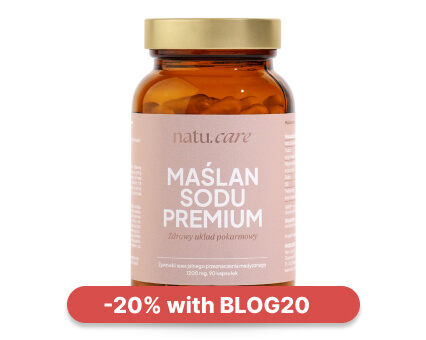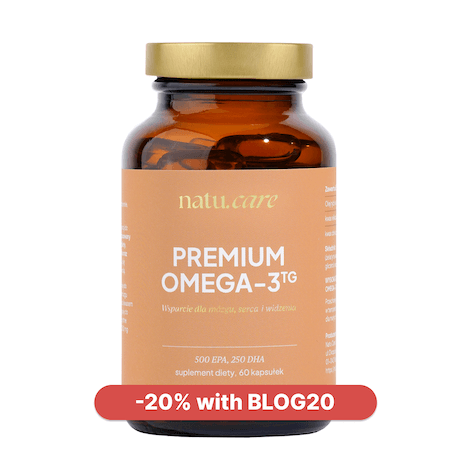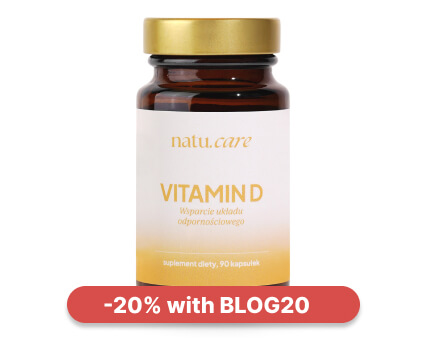Glutathione: what it is, contraindications, what it helps, effects
Glutathione is one of the most potent antioxidants for supporting the body's health. Find out how it works and where to get it from.


Learn more about our editorial process
.

Learn more about our editorial process
.

Learn more about our editorial process
.

Learn more about our editorial process
.
Why you can trust us
Articles on Natu.Care are written based on scientific research, data from government websites and other reliable sources. The texts are written in cooperation with doctors, nutritionists and other health and beauty experts. Articles are reviewed before publication and during significant updates.
.Learn more about our editorial process
.Information about advertisements
Content on Natu.Care may contain links to products from the sale of which we may receive a commission. When creating content, we adhere to high editorial standards and take care to be objective about the products discussed. The presence of affiliate links is not dictated by our partners, and we select the products we review ourselves completely independently.
.Learn more about our terms and Conditions
.Glutathione is one of the most powerful antioxidants in the body. This compound counteracts oxidative stress, which is the cause of many diseases. Find out how it works and how to dose it safely.
With pharmacist Ilona Krzak, we have compiled the most important information about it.
From this article you will learn:
- What glutathione is and how it works. .
- Where glutathione occurs. .
- What are the symptoms of its deficiency.
- What are the symptoms of its deficiency?
- Whether there are contraindications to its use. .
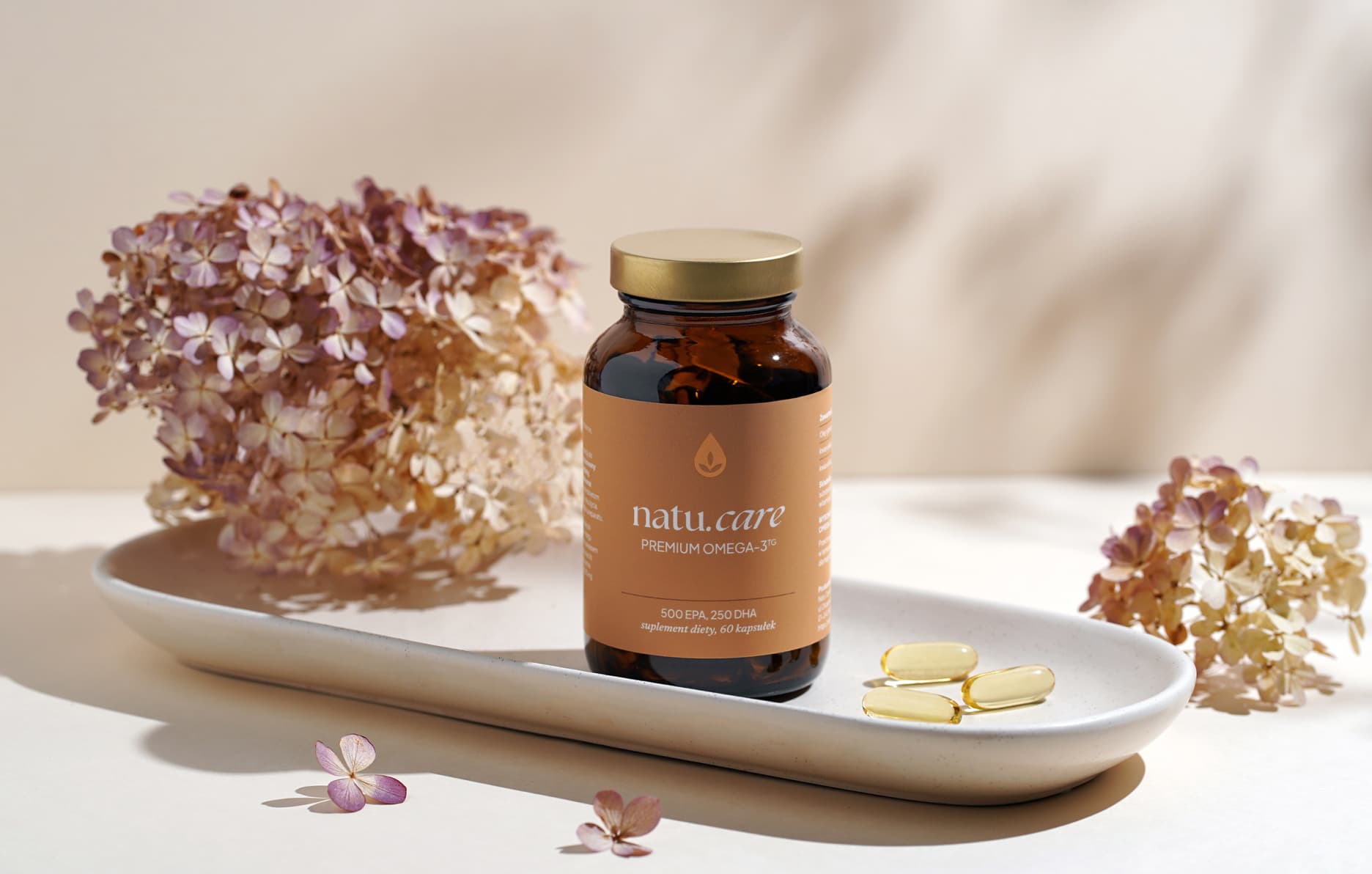
Sprawdź, za co pokochały go tysiące klientek Natu.Care Premium Omega-3ᵀᴳ -15% z kodem BLOG15
Natu.Care Omega-3ᵀᴳ Premium
Natu.Care Omega-3ᵀᴳ Premium dla zdrowia serca, mózgu i odporności. Najlepsza przyswajalność. Optymalna dawka 750 mg. Przebadana przez niezależne laboratorium.
Zobacz więcej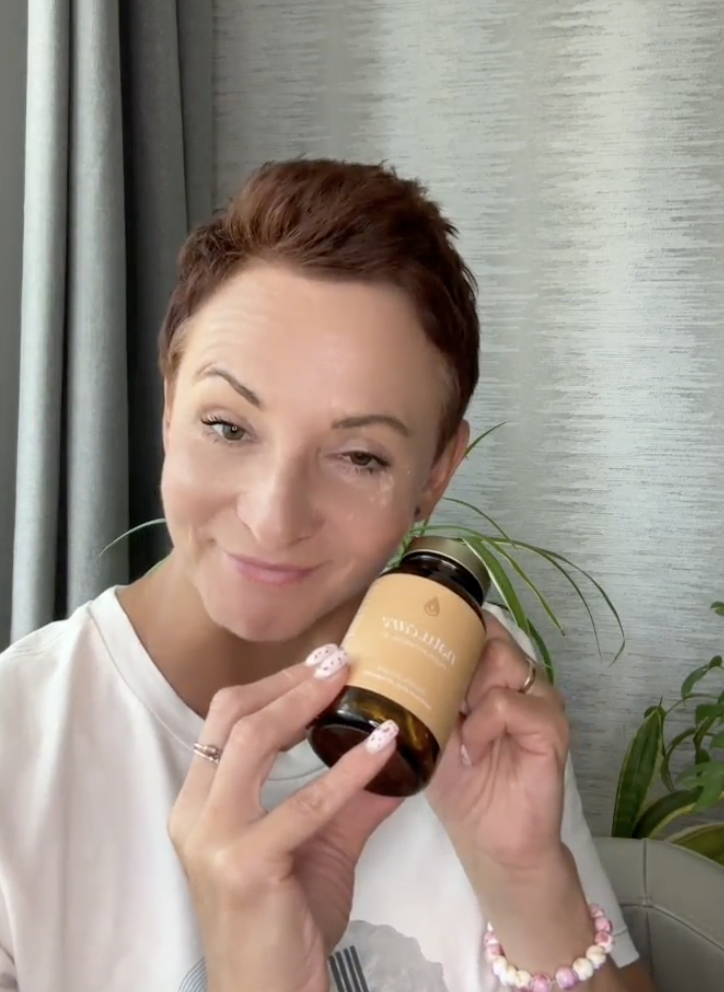
Produkt ma super skład, transparentną etykietę i co dla mnie jest ważne – małe kapsułki do połknięcia. Nie ma też nieprzyjemnego efektu odbijania rybą, który miałam spożywając inne produkty. Widzę znaczną poprawę odporności. Polecam!@Kasia P.
See also:
.
What is glutathione?
.
Glutathione is an essential antioxidant produced by the body. The organs use it to protect against harmful substances such as free radicals, heavy metals and some drugs and toxinsand.
Glutathione is known as the 'master antioxidant'. It is involved in many important processes in the body, such as DNA repair, protein synthesis, transport amino acids or immune system support. It is present in all cells and is crucial for maintaining optimal healthand.
His levels can be increased through a healthy diet, regular exercise, adequate sleep and avoiding stress. Low levels of glutathione can lead to oxidative stress, which will result in a number of health problems such as chronic, neurological, metabolic, cardiovascular and respiratory diseases .
Glutathione itself acts as an antioxidant, but is also an activator for various antioxidant enzymes..
 .
.
Ilona Krzak Master of Pharmacy
.
What is liposomal glutathione?
.
Liposomal glutathione is a form of glutathione that provides better bioavailability of this substance. The name "liposomal" comes from the word "liposome", which is a tiny vesicular structure containing a layer of fat (lipids) that can surround and carry substances such as glutathioneand.
What formula does glutathione have?
.
Glutathione (GSH) is a tripeptide composed of three amino acids: glutamate, cysteine and glycine. Due to the presence of a sulfhydryl (-SH) group in cysteine, it is a peptide with strong antioxidant properties. Its formula is: C10H17N3O6Sand.
What glutathione helps - effects
.
Glutathione (GSH) is a powerful antioxidant naturally produced by the human body. It plays a key role in many basic biological processes and offers a wide range of health benefits.
What does glutathione affect?
.
Cell protection
.
Glutathione plays a key role in protecting cells by neutralising harmful free radicals. Free radicals are molecules that contain unpaired electrons, making them highly reactiveand.
They can cause damage to cells, resulting in ageing and diseases such as cancer. Glutathione is able to 'catch' free radicals and thus neutralise their negative effectsand.
Additionally, it aids the absorption of vitamins E and C, which also act to protect cells. Glutathione is therefore crucial for maintaining health at a cellular level and protecting against uncontrolled oxidative stressand.
Support for the immune system
.
Glutathione plays a key role in the production, proliferation and function of lymphocytes, which are an essential component of the immune system responsible for the immune response to pathogens. Adequate levels of glutathione are therefore essential for an efficient and effective fight against infectionand.
What makes glutathione so unique is its ability to modulate the immune response. This peptide can nullify inflammation by regulating pro-inflammatory cytokines, counteracting the negative effects of chronic inflammation .
Detoxification of the body
.
All cells in the body have the ability to produce glutathione, but it is produced most by the liver -the main organ involved in filtering toxins from the blood .
Glutathione is involved in two stages of detoxification - in the first it converts fat-soluble toxins into less harmful metabolites, and in the second stage it helps convert these substances into hydrophilic (water-soluble) forms that can be easily excreted from the body by the kidneysand.
.
The role of glutathione, therefore, is to protect the body's cells from the damaging effects of different types of toxins - from those from the external environment, such as air pollutants or chemicals, to those produced internally, such as products of metabolism .
.
Glutathione behaves like such a rubbish truck. It collects toxins and inactivates and transports them to expel outside the cell..
 .
.
Ilona Krzak Master of Pharmacy
.
Improving brain function
.
Glutathione supports the protection of brain function and neuronal health. Through antioxidant activity, it neutralises free radicals and reduces oxidative stress, which is one of the factors leading to neurodegenerationand.
This prevents cellular damage at the neuronal level and prevents long-term inflammation in the brain, which can lead to neurological diseases such as Alzheimer's and Parkinson's .
.
Additionally, glutathione supports the efficient transport of amino acids across the blood-brain barrier, which is essential for the proper functioning of nerve cells. Some studies have also suggested that it may help to combat symptoms of mood disorders such as depression and anxiety, although this requires further researchand.
Natu.Care Collagen Premium 5000 mg, mango & passion fruit

- Collagen content: 5000 mg marine collagen hydrolysate
- Additional active ingredients: vitamin C, low molecular weight hyaluronic acid (and L-theanine and coenzyme Q10 in cocoa flavoured collagen or vitamin A and vitamin E in mango–passion fruit flavoured collagen)
- Form: powder sachets
- Dose: 1 sachet per day
- Sufficient for: 30 days
Product description
Fish collagen from the Natu.Care brand in a dose of 5000 mg, based on certified ingredients of the best quality. Regular supplementation will positively influence the appearance of the skinóry, hairów and nails – they will be rebuilt and strengthened from the inside.
In addition to collagen, which is valuable for health and beauty, it also offers other active ingredients that help to maintain a youthful complexion, shiny hair and strong nails.
The formula contains a sufficient portion of the active ingredient to positively affect joints, the musculoskeletal system and immunity.
Natu.Care Premium Collagen is available in two flavours – Cacao Bloom and Rise&Shine. Both formulas are based on the following active ingredients: marine collagen hydrolysate, wild roseóbud extract and hyaluronic acid.
Additionally, Cacao Bloom contains natural L-theanine, coenzyme Q10 and defatted Dutch cacao. Rise&Shine instead contains vitamin E and vitamin A.
These are the best collagens in the world.
These best fish collagens on the market also rós taste – Cacao Bloom is a treat for chocolate lovers. Rise&Shine will appeal to those whoólike the refreshing taste of mangoófruit and passion fruit.
Pros and cons
Pros:
- Vitamin C supports the body's collagen production, enhancing its effectiveness.
- An effective dose of hyaluronic acid, which additionally supports skin hydration and joint health.
- Fish collagen absorbs 50% better. Additionally, the manufacturer specifies the fish species it is sourced from (Atlantic cod).
- The composition has been tested by the independent and accredited J.S. Hamilton laboratory.
- MSC (Marine Stewardship Council) quality certification, which confirms that the collagen source supports sustainable fishing practices.
Cons:
- None.
Additional information
Natu.Care's fish collagen receives praise for its delicious taste. You won't find the fishy aftertaste that often comes through in other collagens. Plus, you have two tasty flavors to choose from: cocoa and mango-passionfruit.
Active ingredients like coenzyme Q10, hyaluronic acid, and natural L-theanine provide anti-inflammatory and antioxidant benefits while slowing down aging processes.
User review
Super, after about 6 weeks of use, the skin on my face became noticeably firmer. Wonderful taste.
Ania ZalewskaNatu.Care customer
Natu.Care Premium collagen 10 000 mg, mango-maracuja
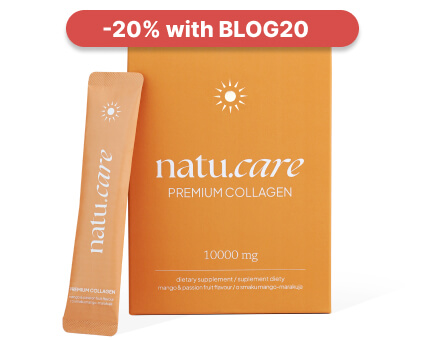
- Collagen content: 10,000 mg marine collagen hydrolysate
- Additional active ingredients: vitamin C, low molecular weight hyaluronic acid (and L-theanine and coenzyme Q10 in cocoa flavoured collagen or vitamin A and vitamin E in mango–passion fruit flavoured collagen)
- Form: powder sachets
- Dose: 1 sachet per day
- Sufficient for: 30 days
Product description
One of the strongest collagens on the market, whichós provides as much as 10,000 mg in a daily serving. This allows the formula to effectively support the condition of the skin, hair and nails.
With this supplement, you will support your beauty, which will allow you to visually stop the ageing process and feel a second youth!
Natu.Care Collagen Premium 10 000 mg comes in two flavours – cherry and mango-maracuja. Both formulas have the same product backbone – collagen, hyaluronic acid and vitamin C.
In the cherry version you additionally find glucosamine, chondroitin and Indian frankincense resin extract. Mango-maracuja, on the other hand, contains vitamin E and vitamin A.
Pros and cons
Pros:
- Tested collagen formula – SeaGarden, whose effects have been confirmed in clinical studies.
- Effective dose of hyaluronic acid, additionally moisturizing the skin and positively impacting joint health.
- Vitamin C supports the body’s natural collagen production.
- The composition has been tested by the independent and accredited J.S. Hamilton laboratory.
- The product has an MSC (Marine Stewardship Council) quality certification – the collagen source supports sustainable fishing practices.
Cons:
- None.
Additional information
Users praise Natu.Care Collagen Premium for the easy dissolvability of the powder.
User review
I noticed a significant improvement in my skin texture after a few weeks of taking collagen regularly. My complexion is now as soft as velvet!
Natu.Care Collagen Premium 10000 mg, cherry

- Collagen content: 10,000 mg of hydrolyzed bovine collagen
- Additional active ingredients: vitamin C, low molecular weight hyaluronic acid, glucosamine, chondroitin, extract of Indian frankincense resin (boswellia serrata)
- Form: powder sachets for drinking
- Serving: 1 sachet per day
- Lasts for: 30 days
Product description
One of the strongest collagens on the market, providing as much as 10,000 mg per daily serving. This product can effectively support the condition of joints, skin, hair, and nails.
With this supplement, you will support your skeletal and joint system as well as your beauty, helping you visually halt the aging process and feel rejuvenated!
Pros and cons
Pros:
- The daily portion of collagen is very large – as much as 10,000 mg.
- Proven collagen formula – COLLinstant, whose effectiveness has been confirmed in clinical studies.
- Effective dose of hyaluronic acid, which additionally moisturizes the skin and positively affects joint health.
- Vitamin C supports the body's natural collagen production.
- Glucosamine is a fundamental building block of compounds found in joint cartilage and a component of collagen that gives elasticity to connective tissue in tendons.
- Chondroitin is a natural component found in the human body, mainly in cartilage. This large molecule (mucopolysaccharide) has the ability to absorb water, which helps maintain the elasticity and resilience of cartilage.
- Frankincense resin extract supports blood circulation and joint mobility and reduces their stiffness. It may help alleviate inflammatory conditions.
- The composition has been tested by the independent and accredited J.S. Hamilton laboratory.
Cons:
- None.
Additional information
Users praise Natu.Care Collagen Premium for the easy dissolving of the powder.
Premium Sodium Butyrate
Product description
Premium Sodium Butyrate is a natural support for your digestive system. With a high dose of butyric acid (940 mg), it supports the regeneration of the intestinal mucosa, improving gut health and function, and aids in the absorption of nutrients. By taking care of your intestines, you're taking care of the health of your entire body.
Studies involving people suffering from irritable bowel syndrome confirm that sodium butyrate is ideal for supporting issues related to bacterial flora imbalances (for example, after antibiotic therapy), constipation and diarrhea, inflammation of the intestinal mucosa, or a diet low in fiber.
Premium Sodium Butyrate capsules are made using the innovative DRcaps® technology. This guarantees that the active ingredients in the product are protected from the destructive effects of stomach acids and digestive enzymes. As a result, we can be sure that the beneficial ingredients are released in the small intestine and are fully absorbed by our body.
Premium Sodium Butyrate from Natu Care is 100% tested, and its composition contains only the highest quality raw materials.
Pros and cons
Pros:
- Supports digestive system function
- Helpful for various gastrointestinal conditions, including IBS
- High dose of butyric acid in each capsule
- Eco-friendly, clean, and tested composition
- Free from added sugar, gluten, GMOs, and lactose
- Innovative capsule technology - DRcaps
Cons:
- None
Additional Information
Take 3 capsules daily at any time of the day, preferably with a meal. Swallow the capsules whole with water.
Premium Sodium Butyrate is intended for adults.
The product should be used under medical supervision.
User review
I've been using the product for 2 weeks. My stomach feels lighter, and my digestion has improved. I recommend it.
Natu.Care Premium Magnesium + Vitamin B6
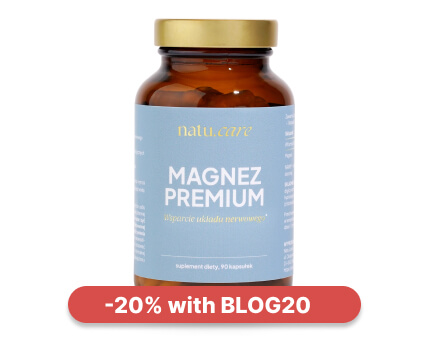
- Magnesium content per day: 305 mg
- Additional active ingredients: Vitamin B6 (2.1 mg)
- Form: capsules
- Serving size: 3 capsules per day
- Sufficient for: 30 days
Product description
The Premium Magnesium + Vitamin B6 dietary supplement is a comprehensive product that combines three organic forms of magnesium (citrate, malate, and diglycinate) and vitamin B6 in highly absorbable forms.
Magnesium is an essential mineral without which our bodies cannot function properly. It supports the immune, nervous, and muscular systems, maintains electrolyte balance, and is involved in cell division and the regulation of mental functions.
Research shows that magnesium supplementation is even more effective when accompanied by vitamin B6, which is included in our product. Vitamin B6 is responsible for the proper functioning of the nervous and immune systems, as well as the proper functioning of the heart.
If you want to safely get rid of feelings of fatigue, concentration problems, hair loss, muscle cramps, trembling, or irritability, reach for Premium Magnesium from Natu.Care, tested by the independent, certified laboratory J.S. Hamilton Poland.
Pros and cons
Pros
- Supports the proper functioning of the nervous and immune systems.
- Reduces feelings of fatigue and tiredness.
- Maintains proper psychological functions.
- The purity of the ingredients (free from anti-caking agents, artificial fillers, and additives such as titanium dioxide, microcrystalline cellulose, talc, magnesium stearate, and silicon dioxide) has been confirmed by laboratory tests.
- High absorption of ingredients.
- Soft capsules that are easy to swallow.
- Suitable for vegetarians and vegans.
Cons
- None.
Additional information
Take with a meal, 3 capsules per day.
The capsules should be taken with at least 250 ml of water.
If you have trouble sleeping, it is advisable to take 1 capsule in the morning and 2 capsules in the evening, no later than 4 hours before bedtime.
Avoid combining with products high in calcium (milk, yogurt, cheese), as this may negatively affect magnesium absorption.
Pregnant and breastfeeding women should consult a doctor before starting supplementation.
User review
I’m very impressed with the speed of delivery. The product itself is of high quality and absorbs well. After two weeks of supplementation, I’ve noticed a significant improvement in muscle recovery, especially during periods of intense training. I highly recommend it!
Product description
The dietary supplement contains omega-3ᵀᴳ, or omega-3 acids in the form of trójglyceridesów. Scientific studies suggest that this form of fatty acidsós up to 2 times better absorbed than the estersós present in many dietary supplements on the market. This means that you are assured of their effectiveness and of supplying yourself with valuable omega acids.
Fatty acids omega-3 are derived from wild anchovy oil. It is a rich source of healthy fats that are essential for the health of the cardiovascular, immune and nervous systems, as well as the proper function of vision, joints muscles.
Scientific research suggests that wild anchovies are a good source of healthy fats.
Scientific research also suggests that an adequate intake of omega-3 fatty acidsós protects against and supports the treatment of depression and anxiety disorders. In addition, omega-3s influence the hydration and appearance of the skinóry and support healthy sleep.
.
The formula contains a total of 750 mg of EPA+DHA acidsós, which is three times higher than the recommended minimum of 250 mg for the Polish population. Omega-3 TG Premium has studies indicating that its TOTOX is 9, which is a very good result.
Supplementation of omega-3 fatty acidsóis recommended for anyone who does not eat 1–2 portions (approximately 300 g) of oily fish per week. Children during growth, seniors, physically active people, vegans and vegetarians, as well as patients undergoing cardiovascular treatment and prevention of heart disease also have an increased need.
Pros and cons
The dietary supplement contains omega-3ᵀᴳ, or omega-3 acids in the form of trójglyceridesów. Scientific studies suggest that this form of fatty acidsós up to 2 times better absorbed than the estersós present in many dietary supplements on the market. This means that you are assured of their effectiveness and of supplying yourself with valuable omega acids.
Fatty acids omega-3 are derived from wild anchovy oil. It is a rich source of healthy fats that are essential for the health of the cardiovascular, immune and nervous systems, as well as the proper function of vision, joints muscles.
Scientific research suggests that wild anchovies are a good source of healthy fats.
Scientific research also suggests that an adequate intake of omega-3 fatty acidsós protects against and supports the treatment of depression and anxiety disorders. In addition, omega-3s influence the hydration and appearance of the skinóry and support healthy sleep.
.
The formula contains a total of 750 mg of EPA+DHA acidsós, which is three times higher than the recommended minimum of 250 mg for the Polish population. Omega-3 TG Premium has studies indicating that its TOTOX is 9, which is a very good result.
Supplementation of omega-3 fatty acidsóis recommended for anyone who does not eat 1–2 portions (approximately 300 g) of oily fish per week. Children during growth, seniors, physically active people, vegans and vegetarians, as well as patients undergoing cardiovascular treatment and prevention of heart disease also have an increased need.
Additional information
The dietary supplement contains omega-3ᵀᴳ, or omega-3 acids in the form of trójglyceridesów. Scientific studies suggest that this form of fatty acidsós up to 2 times better absorbed than the estersós present in many dietary supplements on the market. This means that you are assured of their effectiveness and of supplying yourself with valuable omega acids.
Fatty acids omega-3 are derived from wild anchovy oil. It is a rich source of healthy fats that are essential for the health of the cardiovascular, immune and nervous systems, as well as the proper function of vision, joints muscles.
Scientific research suggests that wild anchovies are a good source of healthy fats.
Scientific research also suggests that an adequate intake of omega-3 fatty acidsós protects against and supports the treatment of depression and anxiety disorders. In addition, omega-3s influence the hydration and appearance of the skinóry and support healthy sleep.
.
The formula contains a total of 750 mg of EPA+DHA acidsós, which is three times higher than the recommended minimum of 250 mg for the Polish population. Omega-3 TG Premium has studies indicating that its TOTOX is 9, which is a very good result.
Supplementation of omega-3 fatty acidsóis recommended for anyone who does not eat 1–2 portions (approximately 300 g) of oily fish per week. Children during growth, seniors, physically active people, vegans and vegetarians, as well as patients undergoing cardiovascular treatment and prevention of heart disease also have an increased need.
Expert opinion
The dietary supplement contains omega-3ᵀᴳ, or omega-3 acids in the form of trójglyceridesów. Scientific studies suggest that this form of fatty acidsós up to 2 times better absorbed than the estersós present in many dietary supplements on the market. This means that you are assured of their effectiveness and of supplying yourself with valuable omega acids.
Fatty acids omega-3 are derived from wild anchovy oil. It is a rich source of healthy fats that are essential for the health of the cardiovascular, immune and nervous systems, as well as the proper function of vision, joints muscles.
Scientific research suggests that wild anchovies are a good source of healthy fats.
Scientific research also suggests that an adequate intake of omega-3 fatty acidsós protects against and supports the treatment of depression and anxiety disorders. In addition, omega-3s influence the hydration and appearance of the skinóry and support healthy sleep.
.
The formula contains a total of 750 mg of EPA+DHA acidsós, which is three times higher than the recommended minimum of 250 mg for the Polish population. Omega-3 TG Premium has studies indicating that its TOTOX is 9, which is a very good result.
Supplementation of omega-3 fatty acidsóis recommended for anyone who does not eat 1–2 portions (approximately 300 g) of oily fish per week. Children during growth, seniors, physically active people, vegans and vegetarians, as well as patients undergoing cardiovascular treatment and prevention of heart disease also have an increased need.
Natu.Care Vitamin D 2000 UI
Product description
Vitamin D plays a crucial role in our health and well-being. It affects calcium and phosphate metabolism, which translates to healthy bones and teeth. It also helps regulate the immune system, and studies indicate its influence on the functioning of the nervous system.
Vitamin D, although called a “vitamin,” is actually a prohormone that our body produces on its own, primarily under the influence of sunlight. Unfortunately, our modern lifestyle contributes to deficiencies of this essential vitamin. Working in enclosed office buildings, using (necessary!) SPF creams, and covering the body with clothing all make it very difficult, if not impossible, to obtain adequate levels of vitamin D from sunlight. This is why appropriate, year-round supplementation is so crucial.
Vitamin D from Natu.Care is a well-tested vitamin D3 suspended in safflower oil, a plant known for its numerous health benefits. The convenient, easy-to-swallow capsule will make supplementation a part of your daily, healthy routine, improving your overall well-being.
Pros and cons
Pros:
- Ensures proper functioning of the immune system
- Supports the maintenance of healthy bones and teeth
- Maintains proper heart, kidney, and muscle function
- Tested by an independent, certified laboratory
- Convenient and easy-to-swallow capsule
- Clean composition - free from added sugar, gluten, GMOs, lactose, and without preservatives or colorants
Cons:
- None.
Additional Information
Pregnant women and breastfeeding mothers should consult a doctor before using the product. This dietary supplement is intended for a healthy adult population up to the age of 75.
Collagen Booster - Glow Stories
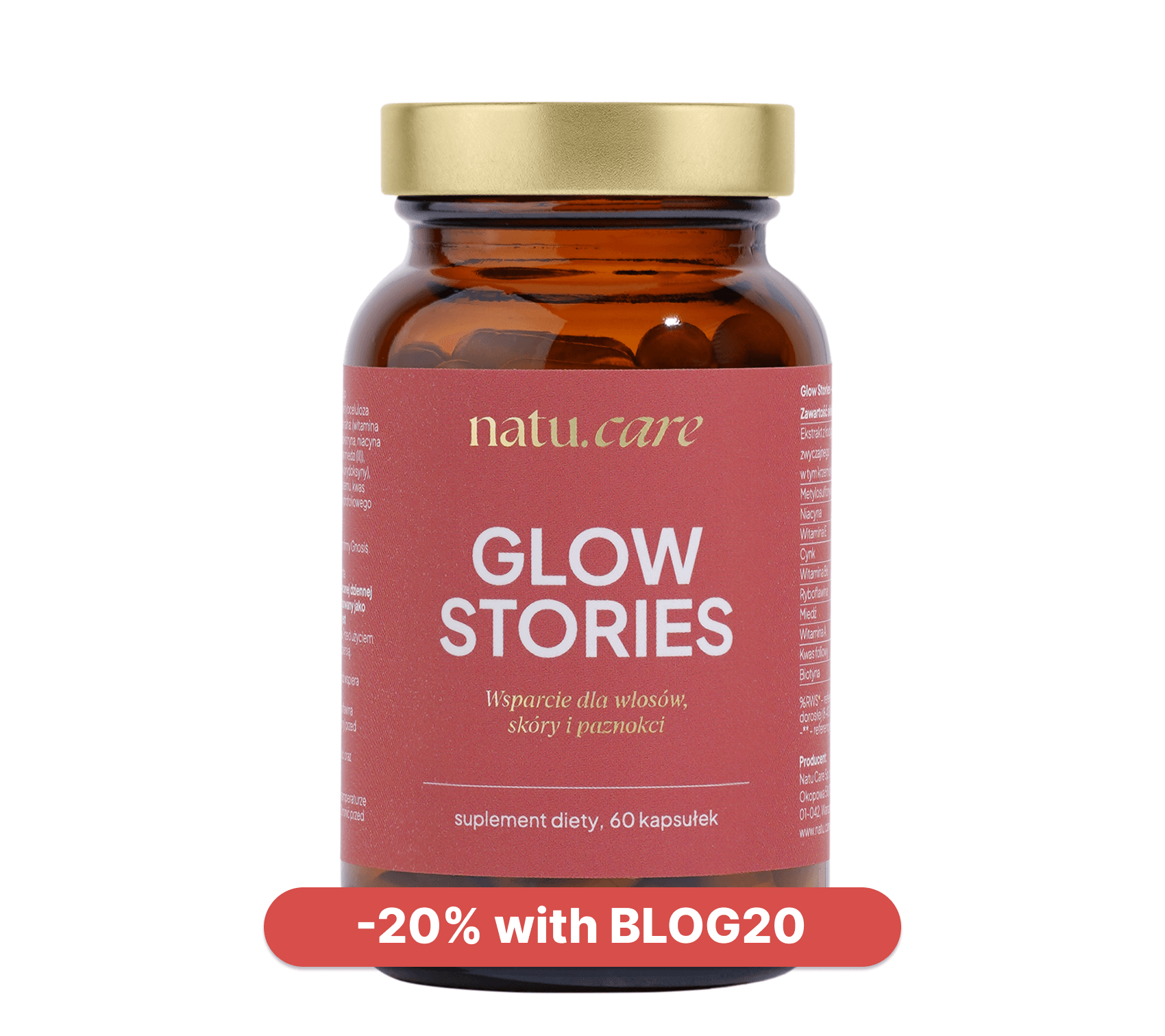
- Active ingredients: bamboo shoot extract, Quatrefolic®, L-Methionine, L-cysteine, vitamin E, vitamin A, niacin (vitamin B3), vitamin B6, vitamin B2 (riboflavin), biotin, zinc, copper
- .
- Form: capsules
- .
- Dose: 1 capsule per day
- .
- Sufficient for: 60 days
- .
Product description
A dietary supplement containing vitamins, minerals and plant extracts thatósupport the skinóhand, hair and nails. The product is especially distinguished by the form of folate – it is Quatrefolic, whichós absorbed very well and is natural.
In addition to valuable vitamins and minerals, such as vitamin A, E, B3, B2 and biotin, the formula contains bamboo shoot extract, whichóry further enhances your beauty.
Pros and cons
A dietary supplement containing vitamins, minerals and plant extracts thatósupport the skinóhand, hair and nails. The product is especially distinguished by the form of folate – it is Quatrefolic, whichós absorbed very well and is natural.
In addition to valuable vitamins and minerals, such as vitamin A, E, B3, B2 and biotin, the formula contains bamboo shoot extract, whichóry further enhances your beauty.
Additional information
A dietary supplement containing vitamins, minerals and plant extracts thatósupport the skinóhand, hair and nails. The product is especially distinguished by the form of folate – it is Quatrefolic, whichós absorbed very well and is natural.
In addition to valuable vitamins and minerals, such as vitamin A, E, B3, B2 and biotin, the formula contains bamboo shoot extract, whichóry further enhances your beauty.
Where does glutathione occur?
.
Glutathione is present in many foods. You will find particularly high concentrations of this antioxidant in fruit and vegetables, especially avocados, spinach, asparagus, pumpkin, melon and broccoli. Green vegetables such as Brussels sprouts, cabbage and kale are also rich in glutathioneand.
Glutathione is also found in animal products such as meat, fish and eggs. Some cereal foods, such as rice bran, are also significant sources of this important tripeptide .
It is worth remembering, however, that food preparation and storage methods can affect glutathione content. For example, cooking significantly reduces the amount of this antioxidant in food .
Glutathione deficiency
.
Glutathione deficiency can result from a number of factors - both external and internal. An important role is played by diet. An inappropriate, nutrient-poor diet, particularly a lack of foods rich in cysteine, one of the amino acids necessary for glutathione synthesis, can lead to glutathione deficiencyand.
Another factor contributing to glutathione deficiency is exposure to environmental toxins such as pesticides, heavy metals, alcohol or drugs. These increase the body's need for antioxidants to neutralise these harmful substancesand.
In people who smoke or inhale toxic particles, there is potential inflammation, which is relieved on an ongoing basis by the glutathione present in the body. This leads to a depletion of the reserves of this antioxidant..
 .
.
Ilona Krzak Master of Pharmacy
Glutathione deficiency can also result from certain health conditions, such as liver disease, HIV/AIDS, or genetic conditions affecting its synthesis. Finally, it is also important to emphasise that glutathione levels naturally decline with age.
Symptoms
.
Glutathione deficiency is often difficult to diagnose as the symptoms are varied and can be ambiguous. A decrease in levels of this antioxidant can affect many functions in the body, leading to a variety of symptomsand.
What are the symptoms of glutathione deficiencyand?
.
- Chronic fatigue. Glutathione is crucial to the body's energy production, so a deficiency can lead to a constant feeling of fatigue.
- Frequent colds or infections. Glutathione is a key regulator of the immune system, so low levels can result in increased susceptibility to disease.
- Neurological problems. Symptoms such as difficulty concentrating, slurred speech, or trembling can result from insufficient protection of nerve cells.
- Chronic inflammation. Low levels of glutathione can lead to chronic inflammation, which will manifest as joint pain, muscle pain and other problems.
- Dermal problems. The skin may become dry and flaky, and its condition will deteriorate.
- Digestive disorders. Glutathione is essential for maintaining digestive health, so a deficiency can result in digestive problems. .
How to increase glutathione levels in the body
.
You can raise your body's glutathione levels in several different ways. The first, and often the best, is a proper diet. You can introduce more foods rich in sulphur amino acids, which are essential for glutathione production, into your diet. These include, for example, eggs, meat, nuts, seeds or onions and garlicand.
Additionally, it is important to supplement with vitamins and minerals such as vitamin C, E, selenium and magnesium, which support glutathione production. It is also important to avoid oxidative stressors such as alcohol and cigarette smoke, which can degrade glutathione in the bodyand.
Another way is to take supplements containing glutathione or its precursors, such as N-acetylcysteine (NAC) or alpha-lipoic acid. It is believed that these can increase glutathione levels in the body. However, it is always advisable to consult a doctor or nutritionist about the decision to take supplementsand.
Glutathione - dosage
.
Glutathione dosage can vary greatly depending on factors such as health status, type of ailment, age, body weight or individual expectations. It is always advisable to consult your doctor or pharmacist before starting supplementation.
Recommended doses of glutathione are usually however, 500 mg per day for supplementation lasting approximately 2 monthsand.
.
In what forms does glutathione occur?
.
Glutathione occurs in several different forms. Depending on your needs and circumstances, you can take it intravenously, via infusions, in tablet form or as a dietary supplement. What are the characteristics of each option?
Tablets
.
Glutathione tablets are the easiest and most accessible form of supplementing levels of this antioxidant. Despite this, the absorption of these preparations by the body can be significantly lower compared to other methods. Glutathione supplements may also contain other ingredients to improve its absorption, such as N-acetylcysteine (NAC).
Infusions
.
Glutathione infusions are one of the most effective methods of increasing the levels of this antioxidant in the body. In this form, glutathione is administered directly into the bloodstream, allowing rapid and efficient absorption. Glutathione infusions are often used for intensive detoxification therapy.
Intravenously (injections)
.
Glutathione injections are another method that provides direct delivery of glutathione to the body. This method is often used for people with chronic illnesses that may impede the absorption of glutathione from food or supplements.
Intravenous glutathione injections are also used for people with chronic illnesses that may impede the absorption of glutathione from food or supplements.
Glutathione - supplementation
.
Glutathione is a powerful antioxidant produced naturally in the body that helps to neutralise free radicals, guide detoxification processes and support the proper functioning of the immune system. In some situations, however, its synthesis may be limited, leading to the need for external supplementation.
Glutathione supplementation is commonly recommended for people undergoing intense training, those suffering from chronic diseases and as support for the immune system. Dosage is dependent on the individual situation and should be tailored to specific needs. The usual recommended dosage is approximately 500 mg per day, for a period of two monthsand.
Despite the potential benefits associated with glutathione supplementation, it is advisable to consult your doctor or a qualified healthcare professional before starting treatment. These professionals will determine whether glutathione supplementation is right for you and how long you should take it.
Provided you have the necessary information, you will be able to find out if glutathione supplementation is right for you and how long you should take it.
Where to buy glutathione?
.
Glutathione is safest to buy from a pharmacy, where you can be sure of the quality and composition of the product. Alternatively, you can find it in some drugstores that sell dietary supplements.
Another option is to buy online, where you will find a wider selection of products. However, remember to use trusted online shops and check other users' reviews. This will allow you to make sure that the product is genuine and meets all safety standards.
Contraindications to the use of glutathione
.
Glutathione, despite its many health benefits, will not be good for everyone. As with any dietary supplement, judicious and informed use is necessary. It is also a good idea to consult your doctor before taking it, especially if you have an existing medical condition, are pregnant, breastfeeding or taking other medications.
Contraindications to the use of glutathioneand:
.
- .
- Allergy or hypersensitivity to any ingredient in the preparation. .
- Asthma. .
- Pregnancy and lactation. .
Glutathione - side effects
.
As with any dietary supplement, glutathione can also cause some side effects, although these are usually rare and mild. Most people tolerate it very well, especially if taken as directed by a doctorand.
The most commonly reported side effects are gastrointestinal complaints such as abdominal pain, bloating and diarrhoea. Less commonly, allergic reactions may occur, particularly in people with hypersensitivity to glutathioneand.
.
In some cases, glutathione supplementation can also lead to reduced zinc levels in the body and bronchospasm in patients with asthma. If you notice the onset of any worrying symptoms after starting glutathione supplementation, you should consult your doctor immediatelyand.
Summary
.
- Glutathione is a powerful antioxidant produced by the body that neutralises free radicals and protects against oxidative stress.
- Glutathione deficiency can lead to health problems, including chronic, neurological and cardiovascular diseases. .
- Glutathione levels can be increased through a healthy diet, exercise, adequate sleep and minimising stress. .
- Glutathione occurs naturally in some foods, especially fruit, vegetables and meat. .
- Typical symptoms of glutathione deficiency include chronic fatigue, susceptibility to infection, neurological problems, inflammation and skin problems. .
- Glutathione supplementation is often recommended for people undergoing intense training, suffering from chronic diseases or as immune system support. .
- Before starting glutathione supplementation, it is advisable to consult your doctor. .
- Some groups of people, such as allergy sufferers, people with asthma or pregnant women, should avoid glutathione supplementation. .
- Possible side effects of glutathione supplementation include gastrointestinal discomfort and allergic reactions. .
FAQ
.Is glutathione safe?
.Every healthy person produces glutathione in the body. In addition, many of the foods you eat on a daily basis contain glutathione. For this reason, it is not considered a dangerous substance but, on the contrary, safe and beneficial.
Can glutathione be consumed during pregnancy?
.There is no conclusive evidence to suggest that glutathione is dangerous for pregnant women. It is a natural antioxidant that is produced by the body and present in many healthy foods.
Although there is no direct evidence that glutathione supplementation is harmful to pregnant or breastfeeding women, you should always consult your doctor before starting such supplementation.
Should patients with asthma avoid glutathione?
.Most people who use glutathione do not experience any asthma-related problems. However, some studies suggest that glutathione supplementation by inhalation in selected patients may induce asthma attacks.
This is why you should always consult your doctor before starting glutathione supplementation, especially if you have asthma.
Can glutathione be obtained from food?
.Yes, glutathione is present in many foods, especially fruits and vegetables such as avocados, spinach, asparagus, pumpkin, melon, broccoli and kale. It is also present in some animal products, such as meat, fish and eggs.
However, it is important to note that cooking and food storage processes can reduce glutathione content.
Can glutathione help in the fight against neurodegenerative diseases such as Alzheimer's and Parkinson's?
.Glutathione, as a natural antioxidant, plays a key role in protecting brain function and neuronal health by neutralising free radicals and reducing oxidative stress, which is one of the factors leading to neurodegeneration.
Although glutathione may counteract damage at the neuronal level and thus help prevent neurodegenerative diseases, a conclusive statement that it is effective against these diseases requires further research.
Can glutathione help maintain skin health?
.Yes, glutathione can contribute to skin health in several ways. First of all, it is a powerful antioxidant that can protect the skin from the damaging effects of oxidative stress and environmental pollutants. In addition, glutathione helps to regenerate vitamins E and C in the skin, which are important for skin health.
Can long-term intake of glutathione have negative health effects?
.There is no conclusive evidence to suggest that long-term use of glutathione has any adverse health effects. Glutathione is a natural antioxidant produced by our body and also present in many foods.
.
Sources
.See all
.Anderson, M. E. (1998). Glutathione: An overview of biosynthesis and modulation. Chemico-Biological Interactions, 111-112, 1-14. https://doi.org/10.1016/s0009-2797(97)00146-4
Aoyama, K. (2021). Glutathione in the Brain. International Journal of Molecular Sciences, 22(9), 5010. https://doi.org/10.3390/ijms22095010
Asantewaa, G., Tuttle, E. T., Ward, N. P., Kang, Y. P., Kim, Y., Kavanagh, M. E., Girnius, N., Chen, Y., Duncan, R., Rodriguez, K., Hecht, F., Zocchi, M., Smorodintsev-Schiller, L., Scales, T. Q., Taylor, K., Alimohammadi, F., Sechrist, Z. R., Agostini-Vulaj, D., Schafer, X. L., ... Harris, I. S. (2023). Glutathione supports lipid abundance in vivo. bioRxiv: The Preprint Server for Biology, 2023.02.10.524960. https://doi.org/10.1101/2023.02.10.524960
Averill-Bates, D. A. (2023). The antioxidant glutathione. Vitamins and Hormones, 121, 109-141. https://doi.org/10.1016/bs.vh.2022.09.002
Giustarini, D., Milzani, A., Dalle-Donne, I., & Rossi, R. (2023). How to Increase Cellular Glutathione. Antioxidants (Basel, Switzerland), 12(5), 1094. https://doi.org/10.3390/antiox12051094
Homma, T., & Fujii, J. (2015). Application of Glutathione as Anti-Oxidative and Anti-Aging Drugs. Current Drug Metabolism, 16(7), 560-571. https://doi.org/10.2174/1389200216666151015114515
Hristov, B. D. (2022). The Role of Glutathione Metabolism in Chronic Illness Development and Its Potential Use as a Novel Therapeutic Target. Cureus, 14(9), e29696. https://doi.org/10.7759/cureus.29696
Jefferies, H., Coster, J., Khalil, A., Bot, J., McCauley, R. D., & Hall, J. C. (2003). Glutathione. ANZ Journal of Surgery, 73(7), 517–522. https://doi.org/10.1046/j.1445-1433.2003.02682.x
Kennedy, L., Sandhu, J. K., Harper, M.-E., & Cuperlovic-Culf, M. (2020). Role of Glutathione in Cancer: From Mechanisms to Therapies. Biomolecules, 10(10), 1429. https://doi.org/10.3390/biom10101429
Lu, S. C. (2013). Glutathione synthesis. Biochimica Et Biophysica Acta, 1830(5), 3143-3153. https://doi.org/10.1016/j.bbagen.2012.09.008
Minich, D. M., & Brown, B. I. (2019). A Review of Dietary (Phyto)Nutrients for Glutathione Support. Nutrients, 11(9), 2073. https://doi.org/10.3390/nu11092073
Pizzorno, J. (2014). Glutathione! Integrative Medicine: A Clinician's Journal, 13(1), 8-12.
Richie, J. P., Nichenametla, S., Neidig, W., Calcagnotto, A., Haley, J. S., Schell, T. D., & Muscat, J. E. (2015). Randomised controlled trial of oral glutathione supplementation on body stores of glutathione. European Journal of Nutrition, 54(2), 251-263. https://doi.org/10.1007/s00394-014-0706-z
Sinha, R., Sinha, I., Calcagnotto, A., Trushin, N., Haley, J. S., Schell, T. D., & Richie, J. P. (2018). Oral supplementation with liposomal glutathione elevates body stores of glutathione and markers of immune function. European Journal of Clinical Nutrition, 72(1), 105-111. https://doi.org/10.1038/ejcn.2017.132
Søndergård, S. D., Cintin, I., Kuhlman, A. B., Morville, T. H., Bergmann, M. L., Kjær, L. K., Poulsen, H. E., Giustarini, D., Rossi, R., Dela, F., Helge, J. W., & Larsen, S. (2021). The effects of 3 weeks of oral glutathione supplementation on whole body insulin sensitivity in obese males with and without type 2 diabetes: A randomized trial. Applied Physiology, Nutrition, and Metabolism = Physiologie Appliquee, Nutrition Et Metabolisme, 46(9), 1133-1142. https://doi.org/10.1139/apnm-2020-1099
Sonthalia, S., Daulatabad, D., & Sarkar, R. (2016). Glutathione as a skin whitening agent: Facts, myths, evidence and controversies. Indian Journal of Dermatology, Venereology and Leprology, 82(3), 262-272. https://doi.org/10.4103/0378-6323.179088
Teskey, G., Abrahem, R., Cao, R., Gyurjian, K., Islamoglu, H., Lucero, M., Martinez, A., Paredes, E., Salaiz, O., Robinson, B., & Venketaraman, V. (2018). Glutathione as a Marker for Human Disease. Advances in Clinical Chemistry, 87, 141-159. https://doi.org/10.1016/bs.acc.2018.07.004
Weschawalit, S., Thongthip, S., Phutrakool, P., & Asawanonda, P. (2017). Glutathione and its antiaging and antimelanogenic effects. Clinical, Cosmetic and Investigational Dermatology, 10, 147-153. https://doi.org/10.2147/CCID.S128339
.
Editorials
Meet the team

Ilona Krzak obtained her Master of Pharmacy degree from the Medical University of Wrocław. She did her internship in a hospital pharmacy and in the pharmaceutical industry. She is currently working in the profession and also runs an educational profile on Instagram: @pani_z_apteki

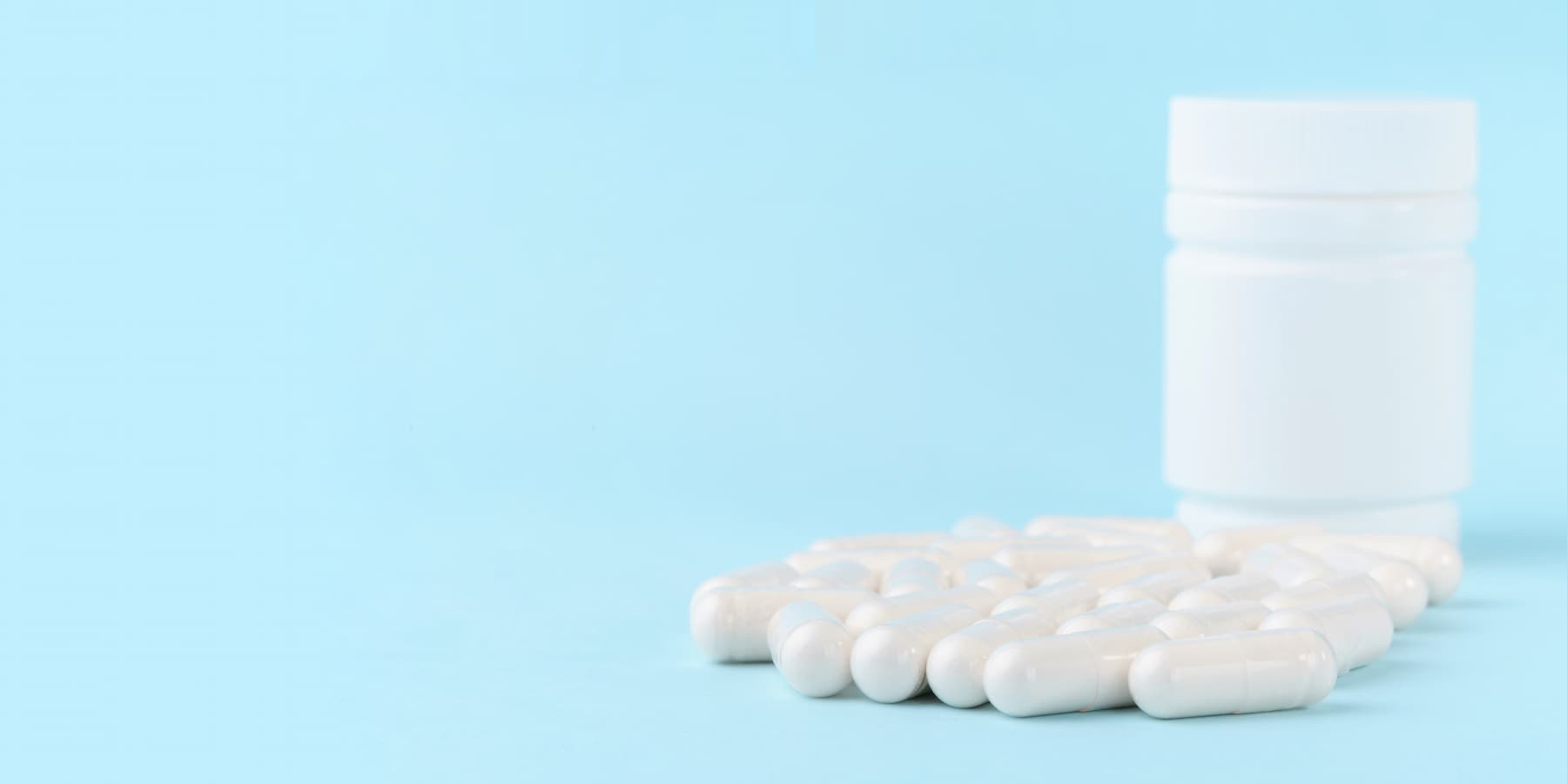
Chondroitin helps the joints and other elements of the body.

See why hip joints hurt and how to treat their ailments.
![Glucosamine for knee, hip and other joints [reviews].](https://cdn-resources.natu.care/uploads/1/glukozamina_hero_7554bc6363.jpg)
Find out how glucosamine works for your joints and what ailments it can help you with.
